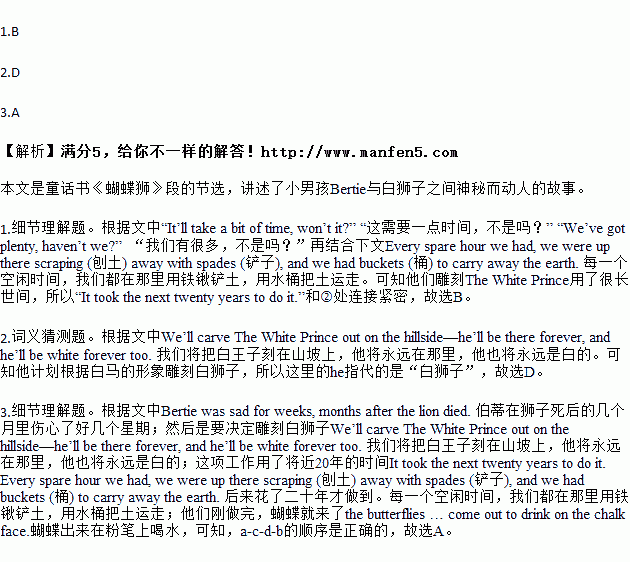题目内容
Bertie was sad for weeks, months after the lion died. There was nothing I could do to cheer him or even console (安慰) him. He would sit for hours in his room, or go off on long walks all on his own. He seemed so shut away inside himself. Try as I did, I could not reach him.
? Then one day I was in the kitchen here, when I saw him hurrying down the hill, waving his stick and shouting to me. “I’ve got it,” he cried, as he came in, “I’ve got it at last.” He showed me the end of his stick. It was white. “See that, Millie?” “Chalk! It’s chalk underground, isn’t it?”
“So?” I said.
“You know the famous White Horse on the hillside at Uffington, the one they carved(雕刻) out of the chalk a thousand years ago? That horse never died, did it? It’s still alive, isn’t it? Well, that’s what we’re going to do, so he will never be forgotten. We’ll carve The White Prince out on the hillside—he’ll be there forever, and he’ll be white forever too. ”
“It’ll take a bit of time, won’t it?” I said.
“We’ve got plenty, haven’t we?” he replied, with the same smile he had smiled at me when he was a ten-year-old boy asking me if he could come back and mend my kite for me.
? Every spare hour we had, we were up there scraping (刨土) away with spades (铲子), and we had buckets (桶) to carry away the earth. It was hard, back-breaking work, but it was a labour (劳动) of love. We did it, Bertie and I, we did it together—paws, claws, tail, mane, until he was complete and perfect in every detail.
? It was just after we’d finished that the butterflies first came. We noticed that when the sun comes out after the rain in the summer, the butterflies—Adonis Blues, they are, I looked them up – come out to drink on the chalk face. Then The White Prince becomes a butterfly lion, and breathes again like a living creature (动物).
? So now you know how Bertie’s white lion became The White Prince and how The White Prince became our butterfly lion.
(Adapted from The Butterfly Lion)
1.The sentence “It took the next twenty years to do it.” should be put at the beginning of one paragraph. Where should we put it?
one paragraph. Where should we put it?
A.? B.? C.? D.?
2.The underlined word “he” in Paragraph 4 refers to (指代) ______.
A.Bertie B.butterfly C.the White Horse D.the white lion
3.The correct time order of the events about the story is ______ .
a. The lion died and Bertie was sad.
b. Butterflies flew to the chalk face.
c. Bertie decided to carve the lion on the hillside.
d. Bertie and Millie spent all the spare time carving.
A.a-c-d-b B.a-d-b-c C.d-a-b-c D.c-b-a-d

